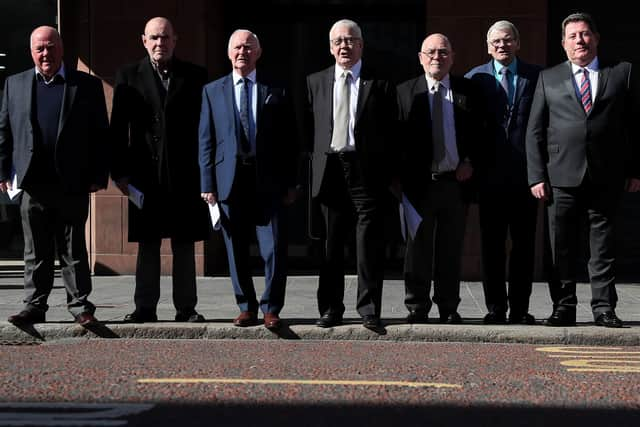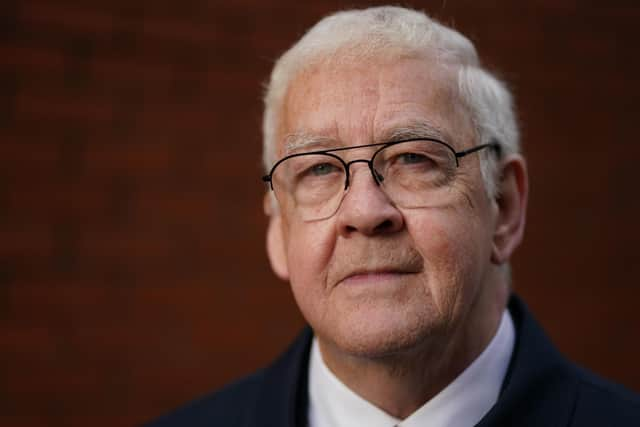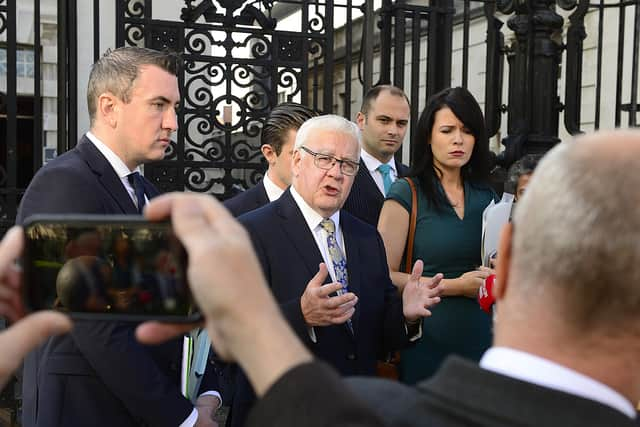PSNI wrong not to investigate ‘hooded men’ torture allegations, court rules
and live on Freeview channel 276
Delivering the judgment on Wednesday, Lord Hodge said the police decision taken after allegations were broadcast in an RTE documentary was “irrational” and should be quashed.
A senior PSNI officer said the force will study the judgment.
Advertisement
Hide AdAdvertisement
Hide AdThe 14 hooded men were subjected to a series of controversial interrogation techniques by the Army and police when they were interned without trial in Northern Ireland in 1971.


The techniques included hooding and being put in stress positions, forced to listen to white noise and deprived of sleep, food and water.
They were also thrown from helicopters that were hovering close to the ground, having been told the aircraft were hundreds of feet in the air.
The European Court of Human Rights previously ruled that while the men suffered inhumane and degrading treatment, it fell short of torture.
Advertisement
Hide AdAdvertisement
Hide AdThe PSNI took the case to the UK’s highest court after failing in Belfast’s Court of Appeal to overturn a High Court ruling that found the police should revisit its decision to end its investigation into the treatment of the men.


Lord Hodge said: “There is no evidence that anyone involved in the authorisation or operation of the hooded men’s ill-treatment has ever been the subject of criminal charges.”
Delivering his judgment, he referred to a 2014 RTE documentary about the hooded men case which included a British government memorandum, known as the “Rees Memo”, which “referred to the use of torture and to its approval by UK ministers”.
Following the broadcast, the PSNI considered whether there was sufficient evidence to warrant a new investigation, but concluded there was not.
Advertisement
Hide AdAdvertisement
Hide AdLord Hodge said: “The court finds that the PSNI’s decision taken on 17 October 2014 not to investigate further the allegation in the Rees Memo was based on a seriously flawed report, was therefore irrational, and falls to be quashed.”


One of the hooded man said the PSNI cannot now carry out any new investigation into the case.
Francis McGuigan said: “I am thoroughly delighted, even though it has taken 50 years to get to where we are today.
“I think the PSNI have to realise that with these judgments against them, they are not the people to investigate it.
Advertisement
Hide AdAdvertisement
Hide Ad“I have no faith in the PSNI doing it. The RUC were the people who did the torture, the interrogation.
“I don’t see how the PSNI can go in and investigate the RUC.
Darragh Mackin, a solicitor for the majority of the “hooded men”, said: “Today’s decision is a landmark victory for the hooded men.
“Since 2014 they have actively contested the decision by the PSNI not to investigate the allegations of torture.
Advertisement
Hide AdAdvertisement
Hide Ad“It was always clear that the initial investigation by the PSNI was nothing more than a window dressing exercise.”
Grainne Teggart, from Amnesty International, said the UK Government should now abandon its plans to end prosecutions relating to the Troubles in Northern Ireland.
She said: “The significance of today is all the greater when we consider what the UK Government’s plans are with regard to legacy.
“The UK Government is planning to close down all investigations and paths to justice for torture victims and for other victims as well.
Advertisement
Hide AdAdvertisement
Hide Ad“We would urge the UK Government to pay heed to the ruling today and to reverse course, abandon these plans and ensure that all victims have their rights to truth and justice.”
However, the Supreme Court did not accept that the PSNI is not sufficiently independent to carry out a new investigation into the hooded men case.
Lord Hodge said: “In our view, it has not been established that the LIB (Legacy Investigations Branch) is not capable of carrying out an effective investigation on the basis either of institutional or hierarchical connection or that it is not capable of conducting an investigation with practical independence.
“There is nothing to suggest that it would not be possible to assign appropriate officers of the PSNI to carry out any further investigations to a proper standard.”
Advertisement
Hide AdAdvertisement
Hide AdPSNI Assistant Chief Constable Jonathan Roberts said: “The Police Service of Northern Ireland acknowledges today’s judgment of the UK Supreme Court and welcomes the clarity it brings to some complex legal issues.
“We recognise the difficult realities that victims, families, friends and broader society continue to deal with as a result of our troubled past.
“We will now take time to study today’s judgment around these complex legacy issues in detail and we will carefully consider its implications for future legacy investigations.
“If we are to build a safe, confident and peaceful society, then we must find a way of dealing with our past and we are committ